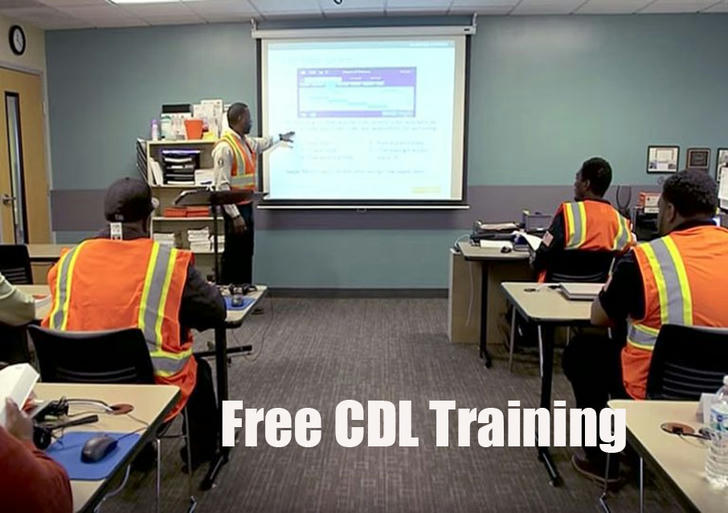Want to become a qualified truck driver? Get started easily with free CDL training!
With the growing demand for qualified drivers in the trucking industry, many people are eager to enter this lucrative industry but are concerned about their lack of driving experience. Free CDLs are supported by states (Colorado, etc.) and community colleges (SOWELA Technical Community College etc.). Free CDL (Commercial Driver's License) courses provide a great opportunity for those with no experience to gain the necessary skills.

Learn what CDL training entails and why it is important
A commercial driver's license (CDL) is a certification that allows an individual to legally drive large trucks, trailers, and other commercial vehicles. CDL stands for "Commercial Driver's License," which is required to drive commercial vehicles such as trucks and buses. Obtaining a CDL is not only a legal requirement, but also a key step to enter the trucking industry. Due to the increasing demand for skilled drivers, drivers with a CDL generally enjoy high salaries and good job security.
example: Lisa from California worked as a waitress in a restaurant, which required her to work more than 40 hours a week, but she only made about $25,000 a year. She worked in the restaurant industry for many years but had difficulty seeing room for career advancement.
After CDL training: She successfully obtained her CDL certification through a free CDL training program funded by the state government. After completing the certification, she got a job as a city delivery driver. Income: Starting salary is $45,000 per year, and the salary level continues to rise with the increase of experience.
Possibility of becoming a truck driver with no experience.
Many states and communities offer free CDL training, and newcomers with zero experience can also sign up. Through these courses, students can not only obtain CDL certification in a short period of time, but also reduce the initial financial burden. In addition to free training provided by the government, some large transportation companies will also sponsor CDL training and even arrange for you to start work immediately after passing the CDL test. These companies usually also provide living allowances during training to help newcomers make a smooth transition.
Training usually includes simulated driving, road driving exercises and vehicle inspections to ensure that students can safely operate commercial vehicles under real conditions. Even if you have no experience at all, you can successfully complete the training.
Advantages of free CDL courses
Cost savings: Commercial driver's license (CDL) training usually costs between $3,000 and $7,000, while free CDL courses eliminate this cost, especially for those who are in a tight financial situation or need to enter the job market quickly. Through the free training program, students can obtain CDL certification without any financial burden, avoiding the impact of tuition fees on learning and career planning.
Quick job opportunities: Many companies that provide free CDL training will directly provide employment opportunities for qualified students after the course. This means that after passing the training and certification, students do not need to spend almost any time looking for a job and can immediately enter the company to start their career.
Paid training: Some companies that provide free CDL training will also pay a living allowance during the training period. Paid training means that students can earn a certain amount of income during the training period, and do not have to worry about living expenses during the training period. This is especially helpful for those who need to support their families or have no other sources of income for the time being: Paid training effectively reduces the financial pressure during the training period, allowing students to focus more on learning and skill acquisition.
Comprehensive support and protection: Free CDL training programs usually provide comprehensive support measures, including job search guidance, practical accompaniment and regular training services to ensure that students successfully complete training, obtain licenses and successfully get on the job.
Quick entry into high-paying industries: After obtaining a CDL, students can quickly enter the high-demand trucking industry. Many companies offer competitive wages and benefits, making this career very attractive. Drivers with CDL certification can engage in long-distance transportation, regional distribution and other jobs with relatively high income levels. Starting salaries are generally between $40,000 and $60,000, and experienced truck drivers can earn more than $70,000 per year.
Frequently Asked Questions and Answers
1:What are the requirements for enrollment?
Most free CDL courses require students to be at least 18 years old (or 21 years old, depending on state law) and hold a valid driver's license.
2:How long does the training process take?
Typically, it lasts 4 to 8 weeks, depending on the intensity of the course and personal learning progress.
3:Is CDL really free or subsidized?
The cost of DL training varies by region and training institution, and is usually between $3,000 and $7,000. However, many states and government programs offer free or subsidized CDL courses, especially for low-income or unemployed people who qualify. In addition, some logistics companies also offer sponsored training, and students can directly start work at the company after completing the training and obtaining a CDL, and even provide stipends during training.
4:How difficult is it to pass the CDL test?
The course will provide the necessary knowledge and skills, and generally speaking, students can pass it easily. There is usually a mock test at the end of the course to help students prepare.
5:Can I continue to learn other driving skills after the course?
After obtaining a CDL, students can choose to continue training to improve their skills and income potential. Many trucking companies offer opportunities for promotion and additional qualifications.
